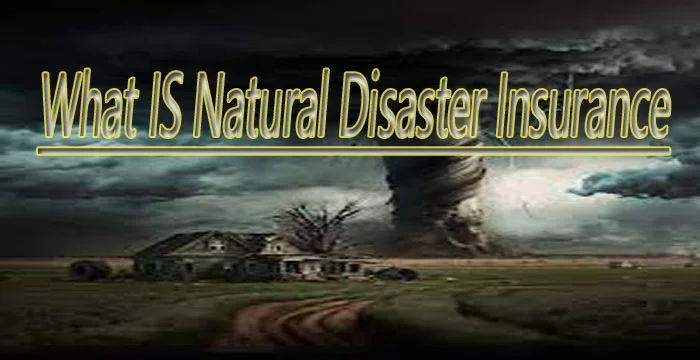introduction
Natural disaster insurance, also known as catastrophe insurance, is a type of insurance coverage that provides financial protection to individuals, businesses, and communities in the event of natural disasters. Natural disasters can include events such as earthquakes, floods, hurricanes, tornadoes, wildfires, and other catastrophic events.
The purpose of natural disaster insurance is to help policyholders recover financially from the damages and losses caused by these unpredictable and often devastating events. The specific coverage and terms of natural disaster insurance can vary depending on the insurance company and the type of policy. Some common types of natural disaster insurance include:
What are the types Natural Disaster Insurance?
1.Homeowners Insurance:
Many homeowners insurance policies include coverage for certain types of natural disasters, such as windstorm, hail, fire, and lightning. However, coverage for specific events like earthquakes or floods may need to be purchased as separate policies or as endorsements to the standard homeowners insurance..
2.Flood Insurance:
Typically sold as a separate policy, flood insurance provides coverage for damage caused by flooding. Standard homeowners insurance policies usually do not cover flood damage. so individuals and businesses in flood-prone areas may need to purchase this specialized coverage through the National Flood Insurance Program (NFIP) or private insurers.
3.Earthquake Insurance:
Similar to flood insurance, earthquake insurance is a separate policy that covers damage caused by earthquakes. Standard homeowners insurance policies typically exclude earthquake damage, so individuals in earthquake-prone regions may choose to purchase this additional coverage.
4.Business Interruption Insurance:
This type of insurance provides coverage for the financial losses a business may incur as a result of a natural disaster. It can help cover expenses such as lost income, ongoing expenses, and the costs associated with temporary relocation.
5.Tornado Insurance:
While tornadoes are often covered under standard homeowners insurance policies, individuals in tornado-prone areas may opt for additional coverage or endorsements to ensure adequate protection.
6.Wildfire Insurance:
In regions susceptible to wildfires, individuals may need specialized insurance coverage to protect against the damages caused by these events. This type of insurance can cover property damage and loss caused by wildfires.
7.Volcano Insurance:
In volcanic areas, individuals may consider volcano insurance to protect against damage caused by volcanic eruptions. This is more relevant in certain geographic locations prone to volcanic activity.
8.Typhoon or Cyclone Insurance:
Residents in areas where typhoons or cyclones are common may seek insurance coverage specifically designed to protect against the damages caused by these powerful tropical storms.
9.Snowstorm or Winter Storm Insurance:
Individuals in regions with severe winter weather may consider insurance coverage for damages caused by heavy snowfall, ice storms, or other winter-related events.
10.Mudslide Insurance:
In areas prone to mudslides, individuals may seek coverage to protect against the damage caused by the movement of mud. debris, and water down a slope.
Conclusion:
Choosing the right insurance is crucial to ensure that you have adequate coverage for your needs. Here are some tips to help you make informed decisions when selecting insurance:
Assess Your Needs:
- Identify and prioritize your insurance needs. Consider factors such as your health, lifestyle, assets, and potential risks.
- Evaluate your financial situation and determine how much coverage you can afford.
Research and Compare:
- Shop around and get quotes from multiple insurance providers. This will help you compare coverage options and pricing.
- Consider both well-known insurance companies and smaller, specialized providers.
Check Reputation and Financial Stability:
- Research the reputation and financial stability of the insurance company. Look for customer reviews, ratings, and feedback.
- Verify the company’s financial strength by checking ratings from independent rating agencies.
Understand Coverage Terms:
- Thoroughly understand the terms and conditions of the insurance policy. Pay attention to coverage limits, deductibles, and exclusions.
- Ask questions about anything you find unclear, and seek clarification from the insurance agent or representative.
Evaluate Customer Service:
- Consider the quality of customer service provided by the insurance company. You want a company that is responsive, helpful, and easy to work with.
- Check reviews and ask for recommendations from friends or family.
Review Policy Flexibility:
- Look for insurance policies that can be adjusted to meet your changing needs.
Bundle Policies for Discounts:
- Inquire about potential discounts for bundling multiple insurance policies with the same provider (e.g., home and auto insurance). This can often result in cost savings.
onsider Deductibles and Premiums:
- Evaluate the trade-off between deductibles and premiums. A higher deductible usually means lower premiums, but you’ll pay more out of pocket in case of a claim.
Review Network Coverage :
- If you’re considering health insurance, check the network of healthcare providers. Ensure that your preferred doctors and hospitals are in-network to maximize coverage.
Stay Informed About Changes:
- Keep yourself informed about any changes to your insurance policy, including updates in coverage, terms, or premiums.
- Regularly reassess your insurance needs, especially after significant life events.
Remember that insurance is a personalized decision, and what works for one person may not be suitable for another. Take the time to make an informed decision based on your individual circumstances and needs. If you have any doubts, consider consulting with an insurance advisor for guidance.

